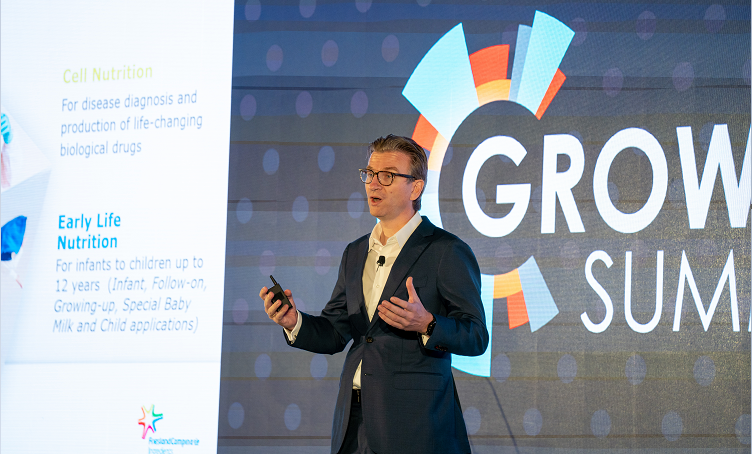This is driven by shifts in consumer demand, such as the belief that plant-based proteins are healthier, as well as corporate businesses’ sustainability and environmental goals.
Taking infant formula as an example, Friesland Campina noticed that companies are starting to offer plant-based or hybrid formulas.
This could be seen in the case of Danone, which launched infant and toddler formulas containing 60 per cent dairy protein and 40 per cent non-GMO soy protein in the Australian and New Zealand market this year.
“We see 35 per cent CAGR plant-based even in the IMF (infant milk formula) sector already, so plant-based is a category that will grow, not only in regular food, but also in IMF, and in medical nutrition.
“We see hybrid solutions already in markets, so this is a trend that we want to tap on as well,” said Job van Rozendaal, managing director APAC, FrieslandCampina Ingredients, said at Growth Asia Summit held in Singapore between September 26 and 28.
He was presenting on the topic “Innovation for good: Friesland Campina Ingredients’ vision for the future of protein.”
 Job van Rozendaal, managing director APAC, FrieslandCampina Ingredients, speaking at the Growth Asia Summit held in Singapore between September 26 and 28.
Job van Rozendaal, managing director APAC, FrieslandCampina Ingredients, speaking at the Growth Asia Summit held in Singapore between September 26 and 28.
Although the company’s core is in dairy business, he said that it has been expanding its protein portfolio to include plant-based, alternative, and precision fermented proteins.
In January, the company partnered biotech firm Triplebar Bio in developing and scaling up the production of cell-based proteins using precision fermentation. Prior to that, the company has been doing precision fermentation since 2016 for human milk oligosaccharides (HMOs).
Two years ago, it also made its debut in plant-based protein with two powder solutions co-eveloped with AGT Foods.
“From dairy protein, we also see the future in plant proteins. We have entered into a partnership with AGT, and with that partnership, we bring faba, pea protein isolates to the market already.
“The next step in the journey for us is precision fermentation. We have been doing precision fermentation for quite some time already, since 2016…
“With the recent announcement of partnership with TripleBar, we are going to bring them to the next level, because we see future in that area as well,” he said.
The expansion is largely driven by shifting consumer needs and companies’ sustainability goals, he explained.
Plant proteins, for example, are perceived by consumers as a healthy and sustainable option.
Citing data from Innova Top Trends Survey 2020, he said that 54 per cent of consumers would consider plant-based alternatives because they were seen as healthier.
The survey, conducted in 10 countries globally, included China, Indonesia, and India as the APAC representatives.
Data from Innova also showed that the average annual growth in food and beverage launches with a plant-based claim had increased at a CAGR of 45 per cent between 2016 and 2020.
The number of pea protein ingredient in new launches also grew at a CAGR of 26 per cent between 2018 and 2020.
“We see a couple of trends and I truly believe that dairy proteins and dairy will be the basis of protein nutrition, but we also see different trends coming up, like plant proteins and precision fermentation.
“I think they can very much exist alongside each other and that’s why we try to tap into all these categories, because of the consumer needs,” he said.
Sustainability goals wise, Friesland Campina aims to reduce greenhouse gas emissions by 63 per cent between 2015 and 2030.
It also aims to produce net climate-neutral dairy by no later than 2050.
Protein for different life stages
Protein is commonly used in sports nutrition products, but in fact, it also plays a role in immune health, infant and elderly nutrition.
With immunity a top concern for parents with infants, van Rozendaal said that the company has introduced bioactive proteins to fulfil this need.
This include lactoferrin and milk fat globule membrane (MFGM). The former has been studied for its immune health benefits.
The company has in fact commissioned a brand new lactoferrin factory in March, making it one of the top two players in the lactoferrin space. It also owns a state-of-the-art whey protein isolate and MFGM filtration plant to meet consumer demand.
Protein is also especially important for the ageing population and consumers who want to lead a healthier lifestyle.
“Protein enriched products for muscle mass maintenance and building are gaining traction.
“And it’s growing for different needs, so for instance for muscle function like physical function, mobility, and performance sports, but you also see that it’s important for resilience, for instance, immune system, recovery, and wound healing, and last but not least, also for the metabolic function,” he said.
In terms of metabolic function, protein, for instance, when taken with carbohydrates, could aid glucose control and insulin sensitivity.
>>> Read full article>>>
Copyright for syndicated content belongs to the linked Source : FoodNavigatorAsia – https://www.nutraingredients-asia.com/Article/2023/10/11/greater-co-existence-between-dairy-plant-based-precision-fermented-proteins-to-come-friesland-campina?utm_source=RSS_Feed&utm_medium=RSS&utm_campaign=RSS










